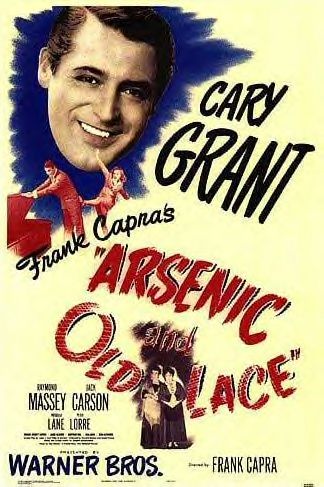
ARSENIC AND OLD LACE
US, 1944, 119 minutes, Black and white.
Cary Grant, Priscilla Lane, Raymond Massey, Peter Lorre, Jean Adair, Josephine Hull, Jack Carson, Edward Everett Horton, James Gleason.
Directed by Frank Capra.
Arsenic and Old Lace has been a very popular play and a great standby of repertory companies as well as amateurs. It was written in the 1940s by Joseph Kesselring. The screenplay for this Frank Capra film was written by veteran Julius J. Epstein (Casablanca).
Cary Grant stars as the ingenuous and sane brother of a very homicidal maniacal family. His two aunts, Abby and Martha Brewster (Josephine Hull and Jean Adair) love to welcome lonely old men into their household, treat them to elderberry wine, which kills them off and they then bury the bodies in the cellar. Their brother, Uncle Teddy (John Alexander) thinks he is building the Panama Canal and uses his diggings for burying the bodies.
The comically sinister aspect of the film is another brother, Jonathan (Raymond Massey doing a Boris Karloff impersonation) who is an escaped criminal who wants to hide out with his associate, Doctor Einstein (Peter Lorre also doing his sinister thing).
Cary Grant is Mortimer, who has to try to deal with all the goings-on in his uncle’s and aunts’ household. In the meantime, he is engaged to Elaine (Priscilla Lane). The police are continually arriving (in the form of Jack Carson and James Gleason).
The film relies on the strange situation, the comic styles of the performers. While it was very successful on-stage, the frantic pace and the manic style made it a bit difficult for film audiences at the time and it was not as popular as expected. In fact, its release was held up for several years till the closing years of World War Two.
Frank Capra had made his name with his social comment films like Mr Deeds? goes to town, Mr Smith goes to Washington, You Can’t Take It With You and Meet John Doe. During the war he made films for morale-boosting purposes. After the war, he made his classic, It’s a Wonderful Life.
1. Was this a comedy or a farce?
2. Was the film a satire? On what?
3. Why have audiences been fascinated by the story of the film? The use of murder and madness, comedy, horror and romance?
4. How well did the film blend its comedy and its horror? Which were the best sequences (for example, Jonathan at the window?)?
5. Was Mortimer a successful central character? as acted by Cary Grant? Grant's personality and style?
Did he overact? Or was this a fitting acting style for the film? Why? Was the audience meant to identify with Mortimer and see the situation through his eyes? Was the film successful in this? (were you just as glad as he to find that he was not a Brewster?)
6. How successful a heroine was Elaine? Her love for Mortimer? The marriage sequences at the beginning?
Mortimer's oblivion of her during the film? Her persevering with her pursuit of Mortimer? Was she important for the film?
7. How attractive were the two sisters? Which sequences illustrated this best? Their personalities and style?
The irony of their lines? Their gentle madness?
8. Was Teddy an attractive character? A plausible madman? The humour of the identification with Teddy Roosevelt? The working in of the Roosevelt plot and Panama with the murders etc.? The charge? What comment on the madness of these characters was made?
9. Were the motives for the murders convincing? Why did the ladies murder? Why did they see it as a charity? Comment on the picture of the police. The inspector who didn’t understand what was going on? The playwright in his naivety?
10. What were your impressions of Jonathon? The Frankenstein overtones? The extreme villainy? The irony of his lines? His face? His relationship to Dr. ?Nw&PA&ems in? Peter Lorre's humour as the doctor? What did this contribute to the film?
11. How effective were the scenes of Mortimer's stupidity ? for example, his being tied up when talking about the play etc.?
12. Was the ending convincing? Was it frantic? Was Happy Dale the best for all of them?
13. The humour of Mr. Witherspoon? While he is murdered in the parlour? An ironic tone to the
Play? Does the film end too lamely.
14. How do you account for the continued popularity of this play and film over the decades? What does it appeal to in its audiences?